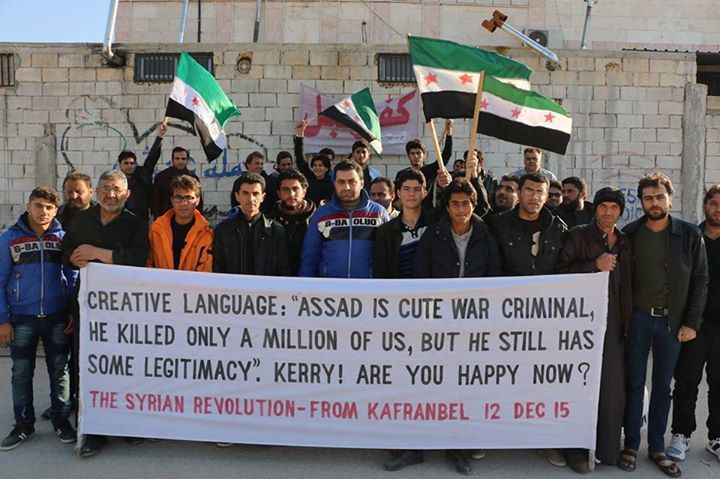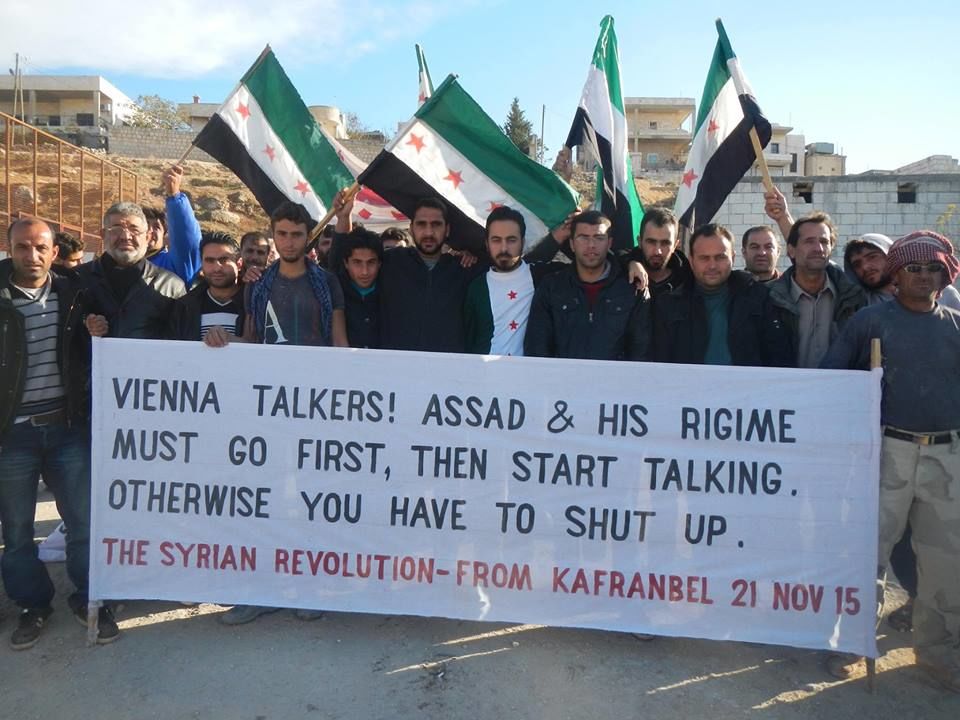The UN Security Council will be debating a new resolution on Syria, but it remains to be seen whether all parties can agree on a solution.
The previous post in our Putin in Syria column can be found here.
As we have been reporting, multiple sources now report that the UN Security Council’s permanent members have agreed on the text of a draft resolution to be voted on at 4 PM eastern (21:00 GMT, about 30 minutes from now). The Associated Press quotes Russia’s deputy foreign Gennady Gatilov as
saying “there is an agreement,” which matches reports from other news
agencies that “diplomats” have said the same thing. Assuming that this is true, it will likely pass, and it if passes this news means there will be no veto.
First, a word of caution — we have not seen the text of this resolution, and so can only comment based on the reporting of larger news agencies. But if what they are reporting is true, this document is almost-certainly doomed to fail.
AP reports:
The draft resolution, obtained by The Associated Press, requests that U.N. Secretary-General Ban Ki-moon convene representatives of the Syrian government and opposition “to engage in formal negotiations on a political transition process on an urgent basis, with a target of early January 2016 for the initiation of talks.”
The draft also says cease-fire efforts should move forward in parallel with the talks, and it asks Ban to report within a month of the resolution’s adoption on a way to monitor the cease-fire.
The draft also notes that the cease-fire “will not apply to offensive or defensive actions” against groups considered terrorist organizations, meaning that airstrikes by Russia, France and the U.S.-led coalition apparently would not be affected.
Let’s remember that the coalition led by the US and the alliance of Russia and Assad have very different definitions for what a “terrorist organization” is. The US coalition is conducting airstrikes against ISIS targets in al-Raqqah and Deir Ez Zor provinces in eastern Syria, and the vast majority of Russian airstrikes are being conducted against US-backed rebels in northwestern Syria. This is not an opinion, but it a fact, verified by multiple NGOs and journalistic outlets, the assessment of essentially every foreign government that is not part of Russia’s coalition, and a close analysis of the videos released by the Russian Ministry of Defence itself. In fact, as John Kerry met with Russian leaders this week, Russia was conducting massive bombing attacks against targets in Syria, but all of those strikes, except one, hit areas not held by ISIS, and the strike which hit ISIS-held territory killed civilians in a crowded marketplace.
It is also a fact that the Assad regime previously agreed with the Arab League to withdraw his troops in 2012, and immediately after doing so he escalated his attacks against civilians and justified this by branding everyone he was targeting as a “terrorist.” In other words, unless “terrorist organizations” is defined in the agreement, Russia and Assad will continue to attack whomever they want, and those groups will thus continue to attack Assad.
There will be no ceasefire.
Read a separate analysis of this pattern, which has played out multiple times in the last five years, here.

A Russian Plan For Syria Is Two Years Too Late
Some say it was a mistake, but if it was then it was the "gaffe heard round the world." John Kerry made a sarcastic, and possibly off-the-cuff, comment about how Syrian President Bashar al Assad might escape U.S.
A ceasefire, therefore, comes down to a matter of definitions. Is there any agreement on the definitions of “terrorist groups”? It does not appear so. Deutsche Welle reports:
Some 20 foreign ministers had been involved in tackling deeply divisive issues, including which Syrian groups should be allowed to take part in peace talks.
Jordanian Foreign Minister Nasser Judeh said he had presented lists from each country of groups they considered were terrorist organizations. Some countries, he said, “sent 10, 15, 20 names” and others more.
AP adds:
“Now I think there will be follow-up steps in terms of countries meeting again to set criteria which will help filter the list,” said Judeh, whose country is tasked with putting the final list together.
So it sounds like the UNSC resolution does not resolve this issue. According to Reuters, the UNSC agreement is only four pages long. The Guardian reports:
The four-page draft, seen by Reuters, backs a nationwide ceasefire in Syria to come into effect “as soon as the representatives of the Syrian government and the opposition have begun initial steps towards a political transition under UN auspices.”
The more names on these “lists,” the greater chances that Western-supported rebel groups will be included on the list, and the smaller the scale of the ceasefire will be.
Then there is the issue of the “initial steps” which will begin in Vienna soon. But there is significant doubt that these talks will resolve this conflict, for many reasons including the problem that many armed opposition groups may not be represented at the talks.
What is the White House’s position on this? US President Barack Obama have a briefing earlier today, a year-end press conference that ended less than ended less than an hour ago. We haven’t see the full transcript yet, but here are a few excerpts:
Anyone who believes that a UNSC draft resolution that does not resolve any of the myriad issues discussed here or below will work is ignoring the definitive history of this conflict that has witnessed this scenario many times since the first bullets were fired by Assad’s soldiers in 2011.
— James Miller
Some breaking news via the BBC:
The five permanent UN Security Council members have agreed the text of a draft UN resolution for the Syrian peace process, diplomats say.
The 15-member council is expected to adopt the resolution later on Friday, officials added.
The UNSC meeting is closed so there’s no way to verify the claim.
— James Miller
The United States and Russia have been working behind the scenes to draft a proposal on Syria that the White House hopes will kickstart the peace process which will, the theory goes, take root in the next meeting of the Vienna conference.
But today it looks like hope for a UNSC resolution is fading. Reuters reports that no resolution has been agreed upon by this morning, and it’s possible that divisions between Russia and the West will mean that today’s 3 PM (eastern time) meeting may not bear fruit:
Russian Ambassador Vitaly Churkin suggested there were significant disagreements on the draft resolution among the Security Council’s five veto powers – the United States, Britain, France, Russia and China.
“I’m not sure it’s going to happen because there are some unfortunately deliberate, or not deliberate, attempts to undercut the Vienna documents and we don’t want to see that,” he told reporters on Thursday without elaborating.
Diplomats said the main problem with the resolution involved Russian and Iranian concerns about how to refer to a bloc of opposition groups that would join U.N.-led peace talks with the Syrian government set to begin in January.
Yesterday the UNSC passed a joint resolution which focused on stopping ISIS’s funding, but note the quote by Russian ambassador Vitaly Churkin, reported here by Reuters:
“This resolution is a critical step, but the real test will be determined by actions we each take after adoption,” U.S. Treasury Secretary Jack Lew told the council after the vote. “We need meaningful implementation, coordination and enforcement from each country represented here, and many others.”
The resolution “expresses concern about the lack of implementation” of previous resolutions targeting al Qaeda and Islamic State, including an “insufficient level of reporting” by states on measures they have taken to implement U.N. sanctions.
The council renamed its al Qaeda sanctions regime the “ISIL (Daesh) and al Qaeda Sanctions Committee” – Islamic State is also known as ISIL and Daesh – and called on states to report within 120 days on their implementation of sanctions.
“Unfortunately the obligations … are not being implemented by all and everywhere,” Russian U.N. Ambassador Vitaly Churkin told the council, adding that “special responsibility for suppressing the channels for financing of ISIL unavoidably rests with states neighboring on Iraq and Syria.”
Churkin is likely suggesting that Turkey is helping to smuggle ISIS’s oil supplies, an allegation which both Turkey and the US categorically deny, and a line of thought which has only entered the Russian narrative in the wake of Turkey shooting down a Russian jet on November 24 aircraft.
After Russia made these allegations it launched airstrikes against reported ISIS oil facilities, but our analysis of the footage provided by the Russian Ministry of Defence found that Russian jets were instead bombing water treatment plants and grain silos — facilities that look, to the untrained observer, like oil storage facilities — just another Kremlin falsehood in their bombing campaign against Syria.
Secretary of State John Kerry’s visit to Moscow will result in a a
diplomatic breakthrough. Read our previous analysis here:

